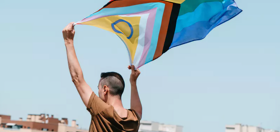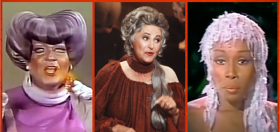
Let’s face it: For many people in the LGBTQ community, dating apps are a necessary evil. Necessary in that they make it easier to meet others around you, but evil in that they are are often a breeding (and not in a good way) ground for superficiality, so-called “preferences” that are almost always low key forms of racism, and ghosting.
In other words, dating apps are basically the holy trinity of everything that is wrong with society, and yet, nearly everyone uses them, including people (like me!) who are disabled. For many disabled folk, dating apps can be a godsend. They allow us a chance to talk to people who, quite frankly, may not give us a second glance IRL (unless of course they are staring at us, but it’s usually not for the reason we want them to stare). It’s harsh, but true.
So how can non-disabled people go about talking to folks who are disabled on apps without making a complete asshat of themselves? Well, I’m glad you asked! Below are just a few tips I (a very disabled fellow) have, with help from my boyfriend (who is not disabled), and a sex expert (who I don’t think is disabled, but who knows because we only legit talked over email?)…
1. Don’t expect us to tell you we are disabled right away.
Does this make us deceivers? Liars? I don’t believe so. But either way, many disabled folks will not typically reveal their disabilities on apps right away, myself included. The fact is, we want you to see us before you see our disability, a right we aren’t usually given in real life. (If you are about to tell me to f*ck off or thinking “but but but!”, just read this post where I ask, “Should I include I’m disabled on my dating profile?”.)
How about we take this to the next level?
Our newsletter is like a refreshing cocktail (or mocktail) of LGBTQ+ entertainment and pop culture, served up with a side of eye-candy.
Even Angela Watson, a sex expert and blogger, agrees.
“Initial contact on any dating app is usually largely superficial with pictures and a quick bio being what draws [people] in,” she says. “Saying you have a disability right on your bio makes it more likely that a person might over or underestimate your level of disability.”
Instead, Watson says that may disabled folks will often talk as a way to establish rapport before disclosing their disabled status. But it is still important the person who is disabled tell you, she says. “This way nobody is being lied to and [the person who is disabled] is still getting a fair shake at the end of the day.”
Which leads to my next tip…
2. Don’t totally ghost someone after they tell you they are disabled.
This is probably my biggest pet peeve. So many times, I would be vibing with a guy, thinking he was a good egg (even though eggs as a food actually aren’t that great, why do people like them???). I would finally work up the nerve to tell him I’m disabled, and then… Radio silence.
The fact is, it takes a ton of courage for us to tell you about our disability, so respect that. If it’s truly an issue–if you simply cannot sleep at night, or you feel as if a disability demon might process you as soon as you enter us –find a polite way to tell us.
I once had a guy tell me, “I’m sorry, I’ve never dealt with that, and I’m not sure where I would even start” after telling him about my Cerebral Palsy. While it sucked to hear, I understood, and let it go. After all, much like you, we’re probably on dating apps to get down, not educate the masses in Disability 101. Moral of the story: Just say SOMETHING.
3. Balance out your questions (i.e. don’t make them all about the person’s disability).
This tip actually came from my boyfriend, who is a perfect angel, so naturally, everything he says is true. As the Law of Flirtatious Chatting (which I just now made up) stats, make sure you ask a variety of questions, and not just questions that relate to our disability. Sure, it’s natural to be curious, but we live with these things permanently, which means we think about and talk about our disabilities enough already. Asking non-disability questions shows us you are actually interested in us as a person. Plus, chances are we’ll answer all your burning disability questions at some point or another, so mix it up.
4. Don’t make it weird when you meet up.
First dates are weird enough. Throw in a disability, and you’re asking for sitcom-level hilarity and awkwardness. But do your best to act like you normally would, says Watson.
“At the time of meeting you should do everything in your power to be cognizant of where you’re looking, as well as your facial expression when you first see them,” she says. “It can be jarring to see someone with mobility issues at first, that’s for certain. Greet them the same way you would any other person without calling too much attention to their condition.”
Opening up with something you’ve noticed about them unrelated to their disability is a great way to let them know you already see them as more than just a medical curiosity, she says.
5. Lastly, give us a chance.
If you are even like, say, 3% interested in us, don’t let “But I’ve never been with a disabled person before, WILL I EVER BE THE SAME IN ALL OF MY EXISTENCE?!” stop you from going on that date or having sex with us. At the end of the day, we are all people looking to get our rocks off. Maybe you’ll learn something new. Maybe you’ll fall in love, like I did. Or maybe he will be a complete asshole. (Spoiler alert: Disabled folks can be total assholes, too!)
If anything, it’ll make a great story, right?
Josh Galassi is very gay and very disabled, if you haven’t noticed. Sometimes, he writes about both those things, and sometimes, he doesn’t. He lives in Seattle with his boyfriend and their dogs Eudora and Carmen Sandiego, who, it turns out, was on Craigslist the entire time (where they bought her). You can find him on Facebook and Twitter, or at a nearby coffee shop obsessing over cold brew.




















rustyiam
Is it wrong that I had a one night stand with a disabled vet once because I felt compassion for him?
Brian
I once hooked up with a guy named Hansel just to be able to say I had sex with Hansel.
PLAYS WELL WITH OTHERS
Sorry Josh epic failure, stop the bullshiit about preferences being a form of “racism” Everyone is entitled to be with whom they are attracted to. As long as you don’t state so as an attack or hatred you are perfectly entitled to do so….
If someone isn’t attracted to you put on your big boy pants and move on to the next profile…